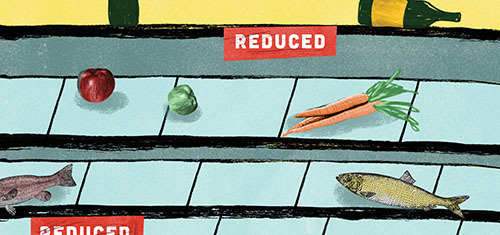One of the three old grocery stores in our town is closing slowly. Its demise was announced a month ago, a casualty of corporate chess, and week by week the discounts mount and the shelves grow thin. The fish counter is empty and dark, and the tall, dour man who ran it transferred to another store two towns west. The meat counter is empty and dark, and the sweet-faced, cheerful girl who ran it took the buyout and is going to take one more stab at college. All the good wines in the wine section are gone, and the only wines remaining are the ones you might use for cooking if you were desperate. The checkout men and women are artificially cheerful, and when you mention how sad and bedraggled the store looks they smile and say it’s almost baseball season!, and you realize they are weary weary weary of talking about the demise of the store and how it was a central gathering point for every single person for a mile around and how because it stayed open until midnight you could swing by for milk or diapers or cough medicine so late at night that no one else was on the road except cops and the patrons of taverns.

The discount bread bin where you could buy day-old bread and pies for half-price is empty. The vast, epic, incredible, alluring array of cheeses from which occasionally my sons were allowed to pluck one sight unseen no longer stretches all the way from canned foods to fresh produce. The fresh produce is now only hardier stuff like apples and oranges and potatoes and turnips. The only cookies remaining are the ones with that horrifying fake plastic frosting that no sane person would eat if you want to retain any of your teeth. The movie-rental box the size of a whopping refrigerator is gone, recalled by its lord and master. The iron bin from which the kids loaded firewood into the trunk of the car is empty. The recycling shed is forlorn. The plastic buckets from which flowers once called plaintively to you as you shuffled past are empty. The shelves of pills and salves and ointments and treatments and elixirs are stripped of toothpastes and lotions and the more colorful vitamins. The frozen food aisle still seems full, but when I look closely all that remains are the expensive items, like shrimp cakes made of shrimp with college educations, and all the humble frozen vegetables are gone.
It wasn’t the cleanest store, and more than once I saw wilted things, and things slightly past their expiration date, and spills on aisle nine that took so long to be cleaned up that you could see the shadow of the spill for weeks afterward. The recycling shed always reeked of beer and cigarettes, the parking lot gleamed with oil slicks, and the newspapers for sale were almost always from the day before, which is to say a century ago, by our modern measure.
Yet the store was steady and sturdy, and its denizens were my neighbors, and its staffers were efficient and workmanlike and friendly under any and all conditions. The store refused to close during snowstorms. The store welcomed huddled, gasping refugees from terrific windstorms. The store happily sponsored baseball and soccer teams, and donated canned food to the local food bank, and allowed Girl Scouts to pitch their annual cookie camps by the door. The store employed many of my neighbors and fed the rest. The cashiers knew a thousand residents by name and gently bent the rules for a few who needed help. Many times I saw a neighbor of mine who wanders the streets all day come into the store, and shuffle to the coffee corner, and pour himself a cup, and shuffle right back out without paying, and no one said a word, no one berated or barked at or reported him, because they knew him to be poor and gentle and addled, and who would begrudge that man a cup of coffee here and there, against the lonely shuffle of his days and years?
The store closes for good next week, and the building will sit empty for a while, and then a new tenant will come, floating balloons and issuing coupons; or the building will be dismantled carefully by expert bulldozers, and another structure will arise; but I suspect that for many years to come my neighbors and I will say where the store used to be when we refer to that space in this wild green world. After we say those words there will come a brief vision of the store when it was healthy and alive, bustling and busy, with avocados two for one today and fresh snapper on sale, and yes, we can buy a watermelon if you boys can carry it out, and yes, I paid for the firewood, thanks for loading that in, boys, and yes, both of you can choose one cheese each from the wall today, close your eyes first, hold my hand, ready?
Brian Doyle is the editor of Portland Magazine at the University of Portland and the author most recently of the novel Martin Marten (St. Martin’s Press).